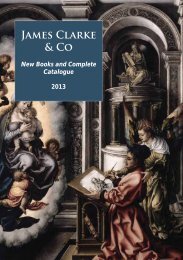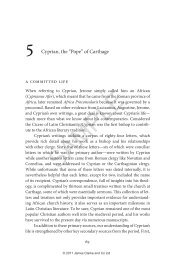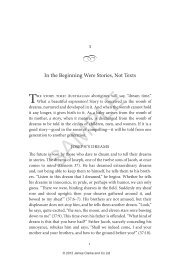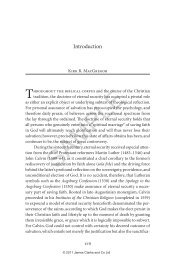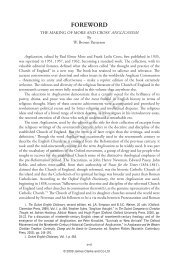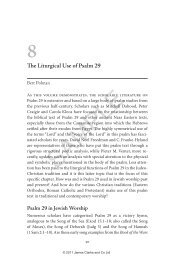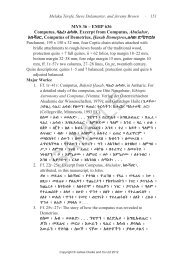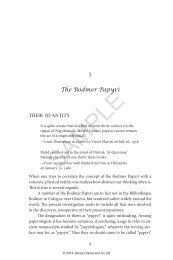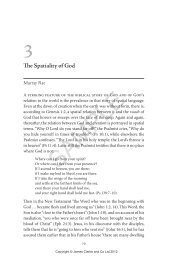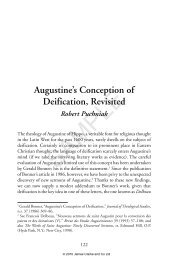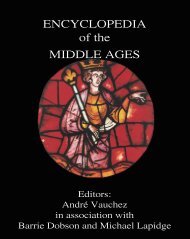Extract from Chapter 1 - James Clarke and Co Ltd
Extract from Chapter 1 - James Clarke and Co Ltd
Extract from Chapter 1 - James Clarke and Co Ltd
You also want an ePaper? Increase the reach of your titles
YUMPU automatically turns print PDFs into web optimized ePapers that Google loves.
The Textual Words of the Analects <strong>and</strong> the Letter to the Galatians<br />
59<br />
To translate the title Analects as “The Sayings of <strong>Co</strong>nfucius” is incorrect.<br />
There is not one author, there are multiple voices with the Master’s<br />
as the dominant one. Eight of the sixteen chapters in Book 1 are not<br />
even the teachings of <strong>Co</strong>nfucius; Book 2 begins with the voice of Master<br />
You; Books 12–20 contain sayings of the disciples; <strong>and</strong> Books 14 <strong>and</strong> 18<br />
even contain anti-<strong>Co</strong>nfucian stories. Of all the four canonical texts—the<br />
Analects, Mencius, the Doctrine of the Mean, <strong>and</strong> the Great Learning—the<br />
Analects is the one that contains sayings closest to the spirit of the Master’s<br />
teachings.<br />
Language of the Analects: Wenyan<br />
The Analects was written in the classical Chinese language called wenyanwen,<br />
the imperial language of ancient China in which most classics<br />
of history, philosophy, <strong>and</strong> literature were written. Classical Chinese is<br />
different <strong>from</strong> baihuawen (“the plain language” or modern Chinese), the<br />
vernacular written language widely used throughout the Chinese speaking<br />
world today. 10 Wenyan (classical Chinese) texts, such as the Analects,<br />
are more poetic, ambiguous, <strong>and</strong> polyvalent than baihua (modern<br />
Chinese) texts. 11<br />
Book 18: Weizi—Accounts of the viscount of Wei who left the tyrant ruler, Duke<br />
Jing of Qi, etc. This book contains few of <strong>Co</strong>nfucius’ sayings.<br />
Book 19: Zizhang—Sayings of Zizhang, Zixia, Ziyou, Master Zeng, Zigong. This<br />
book does not contain sayings of <strong>Co</strong>nfucius.<br />
Book 20: Yao Yue—Yao Said (On government <strong>and</strong> the m<strong>and</strong>ate of heaven.)<br />
10. The 1919 May Fourth Movement brought about the baihuawen, the vernacular<br />
written language widely used throughout the Chinese speaking world. It is more or<br />
less a transcription of how one speaks. The wenyanwen <strong>and</strong> baihuawen have different<br />
styles, grammars, <strong>and</strong> vocabularies. Generally speaking, wenyanwen is more gr<strong>and</strong> <strong>and</strong><br />
formal; it has stricter rules or patterns of expression, especially in poetic compositions.<br />
Baihuawen literally means “plain-saying.” It has a simpler style, looser sentence structure,<br />
<strong>and</strong> therefore needs more words to express the same idea than wenyanwen. Because of<br />
the history, wisdom, <strong>and</strong> beauty of wenyanwen, most writers today use baihua but then<br />
draw on the rich tradition of wenyan in the form of “short sayings,” called chengyu (proverbial<br />
sayings or anecdotes).<br />
11. Ames <strong>and</strong> Rosement have published substantial studies on the philosophical <strong>and</strong><br />
linguistic background of wenyan (classical Chinese). They argue that wenyan is probably<br />
not the exact language the people of antiquity spoke because of the high number<br />
of homonyms in the language, “with anywhere <strong>from</strong> two to seven different characters<br />
pronounced identically. Today the situation is worse. In a common five-thous<strong>and</strong>-word<br />
dictionary, for example, even when the tones are taken into account, forty semantically<br />
SAMPLE<br />
© 2008 <strong>James</strong> <strong>Clarke</strong> <strong>and</strong> <strong>Co</strong> <strong>Ltd</strong>



